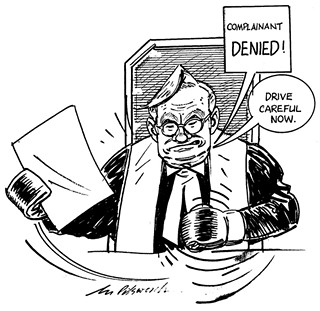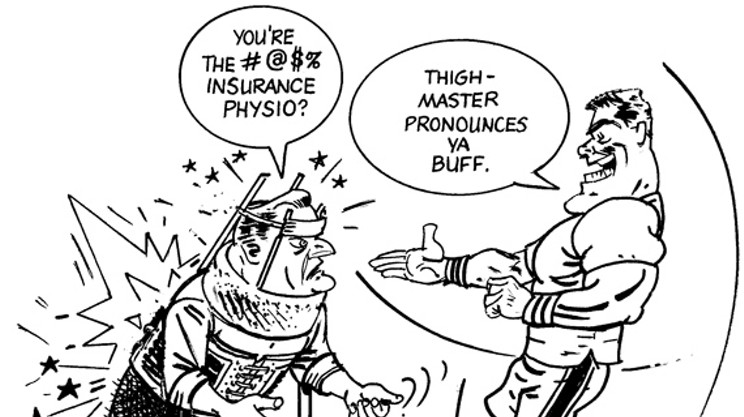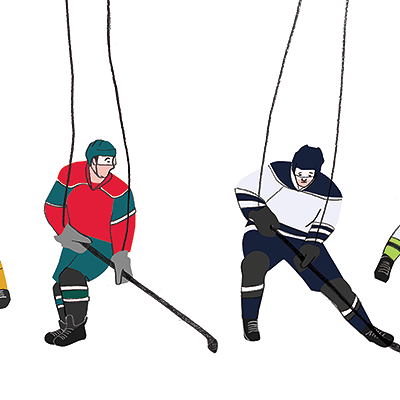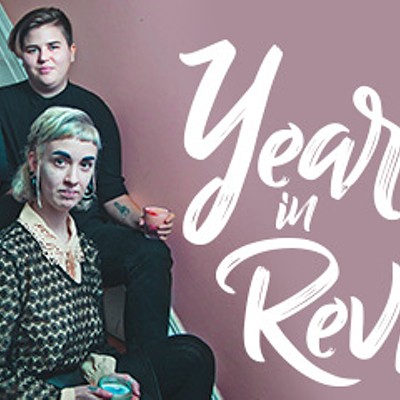First the good news: Nova Scotia's car insurance companies are making bags of money thanks to provincial Tories and Liberals. Now the not-so-good news: Nova Scotia drivers are paying hundreds of millions too much for coverage that sucks. Just ask Melissa Gionet. After her car got sideswiped in December 2003, Gionet suffered a banged-up knee as well as excruciating lower back pain. She missed two months of work as a cashier at the Casino where she was required to lift heavy bags of coins. When she did return to work, she could manage only a couple of shifts a week until she found a new, less-taxing job. Meantime, Gionet was having problems at home. "I can't bath my own daughter," she told me in June 2005. "I can't even play with her because I can't sit on the floor for more than five minutes without my back killing me."
Earlier this month, an unsympathetic Nova Scotia judge ruled, in effect, that the measly $3,100 payout Gionet received from her insurance company was just fine by him. That money covered lost wages as well as compensation for the lower back pain she still suffers. Supreme Court justice Walter Goodfellow ruled that Nova Scotia's $2,500 cap on payments for pain and suffering does not discriminate against accident victims with so-called "minor" injuries. Nova Scotia's Conservative government imposed the cap with Liberal support in 2003 after the insurance industry waged an extensive PR campaign blaming people suffering from "soft tissue" injuries for causing huge increases in insurance premiums. Industry propaganda also suggested that many accident victims were faking their injuries. Goodfellow, one-time president of the provincial Conservatives, rejected arguments that industry propaganda and the Tory legislation that followed stigmatized victims. Instead he bought the claim that capping payments for pain and suffering significantly lowered premiums, making auto insurance affordable for the young, the old, single parents and the poor.
Gionet's lawyer, Barry Mason, points to expert testimony, however, showing that insurance premiums actually fell by much less than the 20 percent required under the 2003 legislation. In fact, Mason says that since the payout cap was imposed, Nova Scotia car insurance premiums have fallen only eight-and-a-half percent while the insurance companies have reaped up to $250 million in extra profits. And no wonder. The definition of "minor injury" is so broad, it can be applied to almost any accident victim. As I wrote in 2005, if a victim suffers chronic pain that requires ongoing medical attention and daily medication, that's only a minor injury even if she has to move to a ground-floor apartment because she can no longer climb stairs. And all psychological injuries such as depression, insomnia, sexual dysfunction or post-traumatic stress disorder are now also classified as minor. Worst of all, the 2003 law puts the onus on victims to prove that their injuries are not minor. In other words, when your insurance company claims you have minor injuries and hands you a cheque for $2,500 or less, you have to prove in court that you're suffering from "a permanent serious impairment of an important bodily function caused by a continuing injury which is physical in nature." Good luck! It will be you and your bank account up against companies that can afford to hire all the fancy lawyers and medical experts they want.
There is still hope, however. Mason is appealing Goodfellow's decision to the Nova Scotia Court of Appeal. Meantime, a judge in Calgary ruled last year in a similar case that Alberta's $4,000 cap on compensation for soft tissue injuries did violate accident victims' rights. Judge Neil Wittmann also ruled that insurance company propaganda unfairly stigmatized accident victims as fakers and fraudsters. Shamefully, the Tories in Alberta are appealing his ruling---a good example of friendly fascism, the system under which governments side with big companies against the rest of us.
Correction: Last week we misspelled letter writer Julie Glaser's name. Our apologies.
Do you have an insurance horror story? Let Bruce Wark know at [email protected].

















